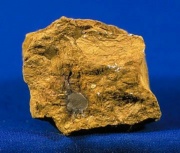Limonite
Description
An amorphous rusty brown mineral composed of hydrated iron oxide. Limonite is often found mixed with clay and sand in the form of a loose powder or a compact, slightly silky, mass. Limonite is formed in marshy and boggy areas and is frequently called bog iron ore. Sites for limonite are Lorraine, Luxembourg, Sweden, Germany (Bavaria, Saxony), Austria, England, and the United States (Connecticut, Massachusetts, Pennsylvania, New York, Virginia, Tennessee, Georgia, Alabama). Limonite has been used as an iron ore, a brown earth pigment and, in ancient times, as an ornamental stone for small carved items such as beads and seals. The term limonite is sometimes generally applied to any hydrated iron ore.
Synonyms and Related Terms
brown hematite; brown ironstone clay; brown iron ore; bog iron ore; limonita (Esp.); limonite (Fr., Port.); Limonit (Deut.); limoniet (Ned.)
Physical and Chemical Properties
- Amorphous mass.
- Fracture = conchoidal.
- Luster = dull to earthy, sometimes submetallic.
- Streak = yellow to brown
| Composition | FeO(OH)-nH2O |
|---|---|
| Mohs Hardness | 5.0 - 5.5 |
| Density | 3.6-4.0 g/ml |
Resources and Citations
- Mineralogy Database: Goethite
- Jack Odgen, Jewellery of the Ancient World, Rizzoli International Publications Inc., New York City, 1982
- Encyclopedia Britannica, http://www.britannica.com Comment: "limonite" [Accessed December 11, 2001].
- C.W.Chesterman, K.E.Lowe, Audubon Society Field Guide to North American Rocks and Minerals, Alfred A. Knopf, New York, 1979
- G.S.Brady, Materials Handbook, McGraw-Hill Book Co., New York, 1971 Comment: p. 422
- Richard S. Lewis, Hawley's Condensed Chemical Dictionary, Van Nostrand Reinhold, New York, 10th ed., 1993
- Van Nostrand's Scientific Encyclopedia, Douglas M. Considine (ed.), Van Nostrand Reinhold, New York, 1976
- Random House, Webster's Encyclopedic Unabridged Dictionary of the English Language, Grammercy Book, New York, 1997
